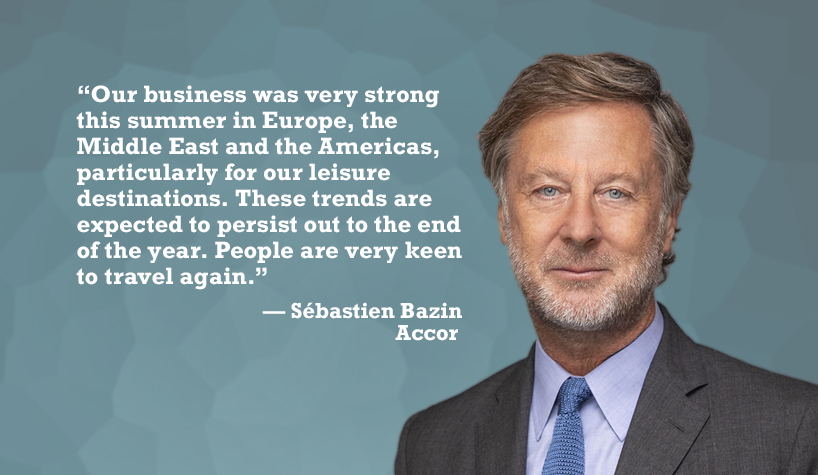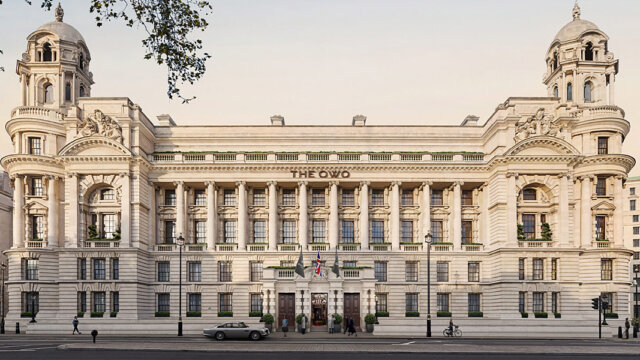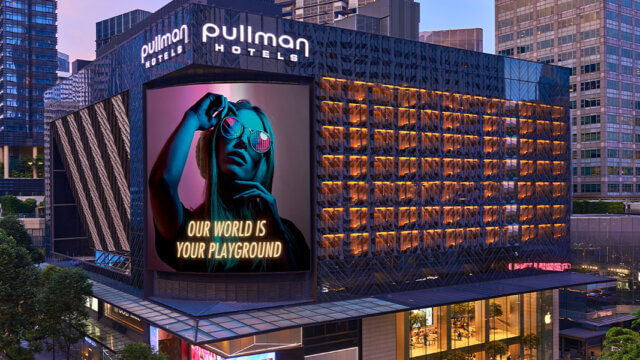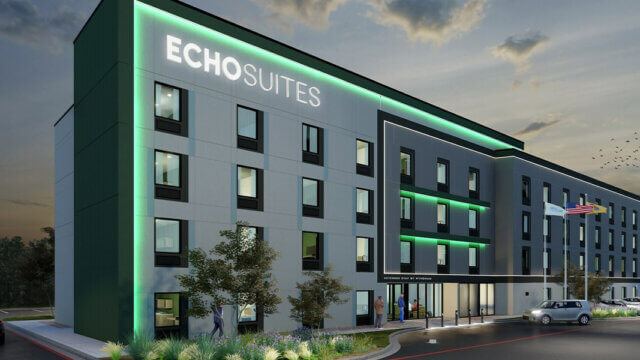Accor, for the third quarter ended Sept. 30, reported that RevPAR improved by 20 percentage points over last quarter thanks to strong performances in key regions for the company.
“This third quarter of 2021 saw a genuine pick-up in demand,” said Sébastien Bazin, chairman/CEO, Accor. “Our business was very strong this summer in Europe, the Middle East and the Americas, particularly for our leisure destinations. These trends are expected to persist out to the end of the year. People are very keen to travel again. With this rebound, our vision of augmented hospitality to serve our guests beyond their hotel rooms, has been confirmed with the acceleration of lifestyle & entertainment activities and takes on its full meaning. Our teams are fully mobilized to support this recovery by rolling out new services, such as the launch of the ALL payment card in France and via global communication campaigns. Our renewed winning spirit, combined with strict financial discipline, are the pillars upon which we will continue to improve our quarter-on-quarter performance.”
- RevPAR improved by 20 percentage points vs. Q2 2021, reflecting a strong activity recovery seen over the summer. Over the quarter, the strong demand translated in higher prices than in Q3 2019 in most leisure geographies such as French and British provinces, the UAE and the U.S. with strong lifestyle hotels. September and October confirmed the return of business travelers and some MICE activity.
- Group revenue for the third quarter of 2021 came in at $687.5 million (589 million euros), up 79% as reported, and 79% like-for-like vs. Q3 2020 (-40% compared with Q3 2019).
- Changes in the scope of consolidation (acquisitions and disposals) contributed a positive
$8.2 million (7 million euros), largely due to the full consolidation of sbe since Q4 2020. - Currency effects had a negative impact of $5.8 million (5 million euros), mainly due to the U.S. dollar (-1%).
- During the third quarter, Accor opened 82 hotels, representing 10,000 rooms for net system growth of +2.5% over the last 12-month period. The group is aiming for net system growth of around 3% on a full-year basis in 2021.
- At the end of September, Accor had a hotel portfolio of 769,000 rooms (5,252 hotels) and a pipeline of 211,000 rooms (1,187 hotels).
Consolidated revenue
During Q3 2021, the Group reported revenue of $687.5 million (589 million euros), up 79% like-for-like (LFL) vs. Q3 2020. This increase amounted to 94% for HotelServices and 57% for Hotel Assets & Other. To provide a comparison with RevPAR (presented as the change vs. Q3 2019 throughout this release), the LFL decline in revenue vs. Q3 2019 is 40%.
HotelServices
HotelServices, which includes fees from Management & Franchise (M&F) and Services to Owners, reported $514 million (440 million euros) in revenue, up 94% LFL vs. Q3 2020 (down 42% LFL vs. Q3 2019). This increase reflects the sharp recovery in activity seen over the summer.
The Management & Franchise (M&F) business reported revenue of $176 million (151 million euros), up 107% LFL vs. Q3 2020 (down 45% LFL vs. Q3 2019), with regional performances correlated to health crisis developments in the countries considered. In general, the sharper decline in M&F revenue vs. RevPAR (down 37% in Q3 2021 vs. Q3 2019) reflects the collapse in incentive fees based on the hotel operating margin generated from management contracts.
Consolidated RevPAR was down 37% overall in Q3 2021 vs. Q3 2019. This decline reflects an environment that remains constrained by the health situation and travel restrictions between different countries.
RevPAR in South Europe posted a solid sequential improvement at -25% vs. Q3 2019, boosted by the strength of domestic leisure tourism demand during the summer.
In France, RevPAR was down 23% from Q3 2019. This reflects a sequential improvement of 40 percentage points vs. Q2 2021, driven by regional cities (down 6%, with average room prices higher than levels seen in 2019), which welcomed domestic leisure tourism guests. The Paris region (RevPAR down 49%) suffered from the absence of international clientele. In September, small MICE took over leisure which was a good confirmation that business is back.
In Spain, RevPAR fell by 39% vs. Q3 2019.
North Europe reported a sequential RevPAR improvement of more than 35 points vs. Q2 2021, a -39% decline compared with Q3 2019.
In the U.K., RevPAR was down 28%, also driven by regional cities (-6%, with average room prices also higher than levels seen in 2019) and stronger performances than London (-51%), which was more affected.
In Germany, where the group is more dependent on business guests, the recovery in activity levels appears to be more lagged, with RevPAR down 46% on Q3 2019, which nevertheless reflects a remarkable 38 percentage point sequential improvement compared with Q2 2021.
Asia-Pacific was the only region to suffer a sequential slowdown, with RevPAR down 57% vs. Q3 2019, and mixed performances by region.
In China, RevPAR was down by 34% during the third quarter of 2021, impacted by a resurgence in COVID-19 cases in July and August. Nevertheless, this impact was short-lived, and business rebounded at the end of September.
Pacific RevPAR was down 56%, impacted by the introduction of lockdowns in major Australian cities. The gradual easing of restrictions since the start of October should enable a business recovery in the fourth quarter.
In Southeast Asia, the more significant decline in RevPAR of 72% can be attributed to the region’s dependence on international travelers and the low level of COVID-19 vaccinations. Nevertheless, quarantine business remains strong in Singapore and vaccination is now starting overall in the region.
In the India, Middle East, Africa & Turkey (IMEAT) region, RevPAR was down 23% vs. Q3 2019. This improved performance was driven by the United Arab Emirates and more specifically by Dubai, which should also benefit from Expo 2020, open since Oct. 1 for six months. Saudi Arabia was impacted by restrictions around pilgrimages.
In the Americas, RevPAR was down 38% vs. Q3 2019, reflecting a marked sequential improvement vs. the second quarter 2021. North/Central America and the Caribbean reported improvements, with RevPAR down by 38%. Canada, where borders reopened gradually from August, made a notable contribution to this performance. In South America, where RevPAR was down 39%, the improvement was driven by large-scale vaccination campaigns.



